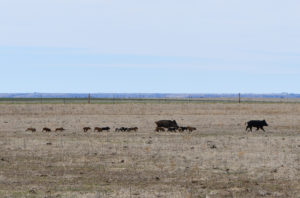Writer: Susan Himes, 325-657-7315, Susan.Himes@ag.tamu.edu
Contact: Pascual Hernandez, 325-387-3101, Pascual.Hernandez@ag.tamu.edu

Feral hogs are just one of the many invasive species that can be problematic for Texas farms and ranches. (AgriLife Extension photo by Kay Ledbetter)
SONORA — The Texas A&M AgriLife Extension Service offices in Sutton and Crockett counties will present a Texas Invasive Species Workshop on April 17 at the Sutton County Civic Center, 1700 N. Crockett Ave., Sonora.
Onsite registration is at 8 a.m., and the program will begin at 8:30 a.m. Three Texas Department of Agriculture continuing education units – one general, one laws and regulations, and one integrated pest management – are available for those with a pesticide applicators license.
The cost of the workshop is $15; after April 12, it is $25. The fee covers program materials, refreshments and lunch.
Checks should be made out to Sutton Ag Program Fund and mailed to P.O. Box 1047, Sonora, TX, 76950. For more information or to register, call the AgriLife Extension office in Sutton County at 325-387-3101.
“Invasive species impact our ecosystems and consequently our management of rangelands,” said Pascual Hernandez, AgriLife Extension agent, Sutton County. “With this workshop, we hope to heighten awareness of some of the invasive species that we encounter in the Edwards Plateau. We will take a look at both plant and animal, as well as native and non-native, invasive species.”
Topics and speakers include:
- Feral Hog Impact on Native Plant Communities/Update on Feral Hog Abatement Efforts – Dr. John Tomecek, AgriLife Extension wildlife specialist, College Station.
- Invasive Plants in the Edwards Plateau – Dr. Barron Rector, AgriLife Extension range specialist, College Station.
- Axis Deer Biology, Behavior, Ecological Impact – Matt Buchholz, doctoral student/research assistant, Texas Tech University department of natural resources management, Lubbock.
- Pesticide Laws and Regulations – Corey Pence, Texas Department of Agriculture.
-30-
The post Texas Invasive Species Workshop set April 17 at Sutton County Civic Center appeared first on AgriLife Today.